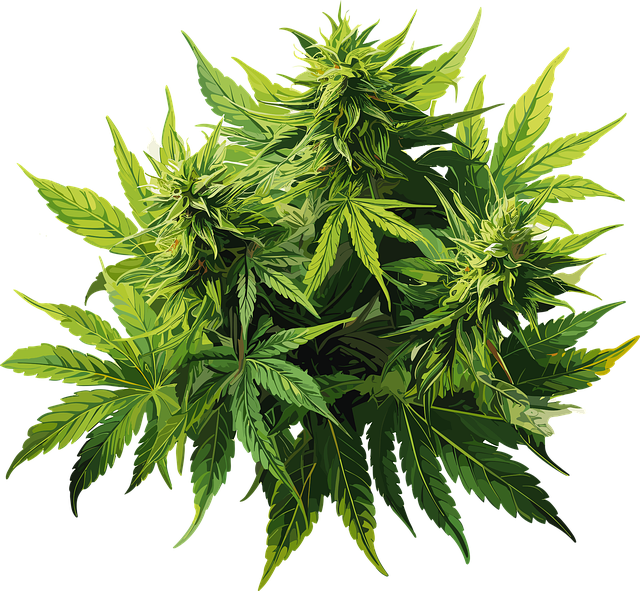The non-psychoactive compound THCA (Delta-9-tetrahydrocannabinolic acid), prevalent in raw or preserved cannabis plants, has been spotlighted for its anti-inflammatory properties. Studies indicate that THCA flower can inhibit pro-inflammatory cytokines and enzymes through interaction with the endocannabinoid system's CB1 and CB2 receptors, suggesting potential therapeutic benefits for inflammatory conditions without the mind-altering effects of THC. The anti-inflammatory efficacy of THCA has been supported by preclinical research, showing its ability to reduce cytokine production in animal models. This makes THCA flower a compelling natural alternative for managing inflammatory conditions like arthritis and inflammatory bowel disease. The anti-inflammatory effects of THCA are attributed to its inhibitory action on certain enzymes and molecules, offering hope for those seeking non-psychoactive solutions to inflammation. As research continues, the potential of THCA flower as a health supplement and its role in integrative medicine grow, emphasizing the need for further investigation into its therapeutic applications and benefits. Users are advised to source high-quality THCA flower products from reputable providers and consult with healthcare professionals before incorporating it into their wellness routine due to individual differences in response and potential interactions with other medications or health conditions. Regular monitoring under medical guidance is recommended to ensure optimal anti-inflammatory outcomes and overall well-being.
Discover the transformative potential of THCA flower, a natural compound with promising anti-inflammatory effects. This article delves into the science behind these properties, unveiling the therapeutic potential of raw cannabis and how it can be safely and effectively incorporated into your wellness routine. From understanding its natural benefits to exploring practical applications, “In Depth THCA Flower: The Natural Anti-Inflammatory Agent” offers a comprehensive look at this emerging wellness solution.
- Unveiling THCA Flower: A Natural Anti-Inflammatory Agent
- The Science Behind THCA's Anti-Inflammatory Properties
- Exploring the Therapeutic Potential of Raw Cannabis
- Integrating THCA Flower into Your Wellness Routine Safely and Effectively
Unveiling THCA Flower: A Natural Anti-Inflammatory Agent

Delta-9-tetrahydrocannabinolic acid (THCA) is a non-psychoactive cannabinoid found naturally in the cannabis plant, particularly in its raw or preserved form. Emerging research has begun to shed light on the potential anti-inflammatory effects of THCA flower. Unlike its well-known isomer, delta-9-tetrahydrocannabinol (THC), THCA does not induce psychoactive effects, making it an attractive option for individuals seeking the therapeutic benefits of cannabis without the high. The anti-inflammatory properties of THCA are thought to stem from its ability to inhibit key pro-inflammatory cytokines and enzymes involved in inflammation pathways. Studies have indicated that THCA may interact with the body’s endocannabinoid system, particularly the CB1 and CB2 receptors, to modulate immune responses, suggesting a role in managing conditions characterized by excessive inflammation.
Furthermore, the therapeutic potential of THCA flower is an area of increasing interest. Preclinical studies have demonstrated that THCA possesses anti-inflammatory properties in various models of inflammation, including those relevant to human health. These findings underscore the need for further research into the development of THCA-based therapies for a range of inflammatory conditions. The natural approach offered by THCA flower aligns with the growing consumer preference for botanical-based remedies, highlighting its significance in the field of natural medicine and health supplementation.
The Science Behind THCA's Anti-Inflammatory Properties

THCA, or tetrahydrocannabinolic acid, is a non-psychoactive cannabinoid found in the raw cannabis plant, which, when heated, decarboxylates into THC, the primary psychoactive component of cannabis. Despite its precursor status, THCA has garnered attention for its potential health benefits, particularly its anti-inflammatory effects. Scientific research indicates that THCA interacts with the body’s endocannabinoid system through its affinity for both CB1 and CB2 receptors, suggesting a modulatory role in inflammation response. Preclinical studies have demonstrated that THCA possesses anti-inflammatory properties, potentially aiding in conditions characterized by excessive inflammation. For instance, animal models have shown that THCA can reduce the production of pro-inflammatory cytokines, which are key drivers of inflammation within the body. This action may offer therapeutic potential for various inflammatory diseases, including arthritis and inflammatory bowel disease. The anti-inflammatory effects of THCA are attributed to its ability to inhibit certain enzymes and molecules involved in the inflammatory process, offering a natural approach to managing inflammation without the psychoactive effects associated with THC. Further research is necessary to fully understand the extent of THCA’s anti-inflammatory properties and its potential role in healthcare; however, the initial findings are promising for those seeking natural alternatives for inflammation management.
Exploring the Therapeutic Potential of Raw Cannabis

Raw cannabis, specifically in its THCA (tetrahydrocannabinolic acid) flower form, has garnered attention for its therapeutic potential, particularly in the realm of anti-inflammatory effects. Unlike its psychoactive counterpart THC (delta-9-tetrahydrocannabinol), THCA exists naturally in cannabis plants and possesses a unique profile that offers health benefits without the high associated with its conversion to THC upon heating or combustion. Preliminary research suggests that THCA interacts with the body’s endocannabinoid system, which regulates various physiological processes including pain, inflammation, and immune responses. Consuming THCA flower in its raw state is believed to offer anti-inflammatory properties that may be beneficial for individuals suffering from conditions such as arthritis or those experiencing acute inflammation due to injury. Furthermore, the anti-inflammatory effects of THCA are thought to stem from its ability to inhibit certain enzymes and receptors involved in the body’s inflammatory response. This makes THCA a subject of interest for both medical researchers and consumers seeking natural ways to manage pain and inflammation. As the understanding of cannabinoids continues to evolve, the potential therapeutic applications of raw THCA flower are an exciting area of exploration within the field of integrative medicine.
Integrating THCA Flower into Your Wellness Routine Safely and Effectively

Including THCA flower as part of a wellness routine can be a thoughtful approach to harnessing its potential anti-inflammatory effects. Tetrahydrocannabinolic acid (THCA), the raw, non-psychoactive form of THC found in cannabis plants, has been studied for its therapeutic properties that may alleviate inflammation and pain. To integrate THCA flower safely into your wellness regimen, it’s crucial to source high-quality, lab-tested products from reputable dispensaries or suppliers. This ensures that you are consuming a product free from contaminants and accurately representing its cannabinoid profile, which includes the desired THCA content.
When incorporating THCA flower into your routine, start with small doses to gauge how your body responds. The anti-inflammatory effects of THCA may vary based on individual physiology and the specific condition you are addressing. It’s advisable to consult with a healthcare professional before making any significant changes to your wellness practices, especially if you are taking other medications or have existing health concerns. Proper dosing, combined with the guidance of an informed practitioner, can help maximize the benefits of THCA flower while minimizing potential risks. Consistent use and careful monitoring of your body’s response will aid in fine-tuning your intake for optimal wellness outcomes.
THCA flower, the raw precursor to THC found in cannabis, has emerged as a subject of scientific interest due to its promising anti-inflammatory properties. This article delves into the natural potential of THCA, elucidating its science and therapeutic effects. For those intrigued by the wellness benefits of raw cannabinoids, integrating THCA flower into your routine can be a prudent choice. With careful consideration for safe and effective use, the exploration of THCA’s anti-inflammatory effects underscores its potential as a natural health adjunct. As research continues to evolve, understanding and utilizing THCA flower may offer novel insights in the holistic approach to inflammation management and wellness maintenance.


